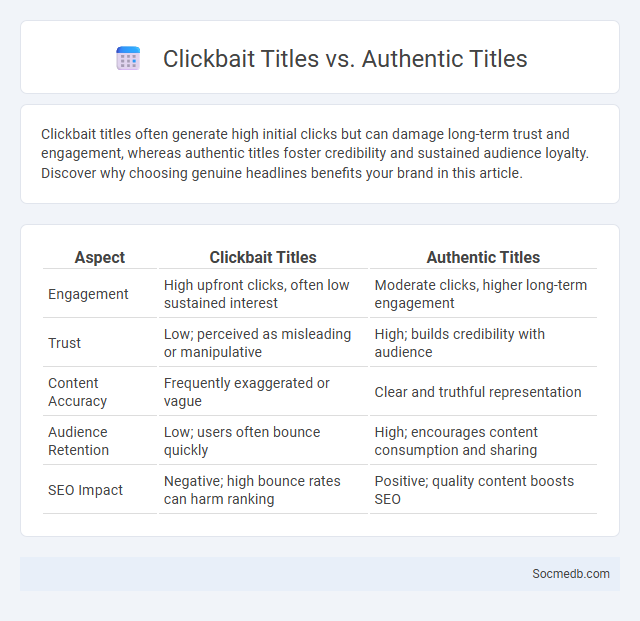
Photo illustration: Clickbait Titles vs Authentic Titles
Clickbait titles often generate high initial clicks but can damage long-term trust and engagement, whereas authentic titles foster credibility and sustained audience loyalty. Discover why choosing genuine headlines benefits your brand in this article.
Table of Comparison
| Aspect | Clickbait Titles | Authentic Titles |
|---|---|---|
| Engagement | High upfront clicks, often low sustained interest | Moderate clicks, higher long-term engagement |
| Trust | Low; perceived as misleading or manipulative | High; builds credibility with audience |
| Content Accuracy | Frequently exaggerated or vague | Clear and truthful representation |
| Audience Retention | Low; users often bounce quickly | High; encourages content consumption and sharing |
| SEO Impact | Negative; high bounce rates can harm ranking | Positive; quality content boosts SEO |
Understanding Clickbait Titles: Definition and Purpose
Clickbait titles are crafted headlines designed to attract attention and encourage users to click on a link by using sensationalized or misleading language. Their primary purpose is to increase web traffic and engagement metrics, often at the expense of content accuracy or relevance. Understanding clickbait involves recognizing tactics such as emotional triggers, curiosity gaps, and exaggerated claims that manipulate user behavior on social media platforms.
What Makes a Title Authentic? Key Traits Explored
Authentic social media titles resonate by accurately reflecting the content while sparking genuine interest through clear, concise language. Your title should incorporate relevant keywords that align with your audience's search intent and support the post's main message. Crafting an authentic title involves balancing creativity with transparency to build trust and encourage engagement.
The Psychology Behind Viral Content
Viral content taps into human emotions such as surprise, joy, and curiosity, triggering strong psychological responses that prompt sharing. Understanding cognitive biases like social proof and emotional contagion helps explain why certain posts spread rapidly across platforms. Your content becomes more shareable when it resonates deeply with audience values and motivates engagement through relatable storytelling.
Clickbait vs Authentic Titles: Impact on Reader Trust
Clickbait titles, which often exaggerate or mislead, significantly reduce reader trust and engagement over time, causing skepticism toward the content. Authentic titles that accurately reflect the article's content foster credibility, increase reader loyalty, and improve long-term audience retention. Studies show that transparent and honest headlines enhance user satisfaction and promote ethical social media practices.
How Viral Content Leverages Titles for Engagement
Viral content leverages titles by incorporating emotionally charged and curiosity-driven keywords that immediately capture user attention, increasing click-through rates. Effective titles often use numbers, questions, or power words that resonate with target audiences and enhance shareability across platforms like Facebook, Instagram, and Twitter. Optimizing titles with SEO-rich phrases also improves visibility in search results, amplifying organic engagement and driving higher traffic to the content.
SEO Implications of Clickbait and Authentic Titles
Clickbait titles often drive higher click-through rates but can increase bounce rates and hurt your website's SEO rankings due to mismatched user expectations. Authentic titles improve user engagement, dwell time, and reduce bounce rates, signaling to search engines that your content is valuable and relevant. Optimizing your social media posts with clear, honest titles enhances your online authority and drives sustainable organic traffic.
Measuring Effectiveness: Clickbait, Authentic Titles, and Virality
Measuring the effectiveness of your social media content hinges on analyzing clickbait versus authentic titles to boost engagement metrics accurately. Clickbait may generate high initial clicks but often results in lower retention and trust, whereas authentic titles foster credibility and sustained interaction. Virality is best assessed through metrics such as share rates, comment volumes, and conversion rates to understand how content resonates and spreads across platforms.
Ethical Considerations in Crafting Online Titles
Crafting online titles on social media demands careful ethical consideration to avoid misleading or sensationalist content that undermines trust. Titles should accurately represent the content to promote transparency and respect for the audience's intelligence, enhancing credibility. Emphasizing truthfulness and accountability aligns with platform guidelines and fosters a responsible digital environment.
Case Studies: Successful Clickbait, Authentic, and Viral Titles
Case studies reveal that successful social media titles often combine clickbait elements with authenticity to maximize engagement and virality. Analyzing viral campaigns, titles that evoke curiosity while maintaining trust have shown higher click-through rates and user retention. Your content can benefit from adopting proven strategies like emotional triggers and clear value propositions embedded in authentic, attention-grabbing headlines.
Best Practices for Balancing Authenticity and Virality in Titles
Crafting social media titles that balance authenticity and virality requires using genuine language that resonates with your target audience while incorporating trending keywords and emotional triggers. Your titles should evoke curiosity and trust, ensuring they reflect the true content without resorting to clickbait tactics. Leveraging data analytics to test engagement metrics helps identify optimal phrasing that maximizes reach without compromising integrity.
 socmedb.com
socmedb.com